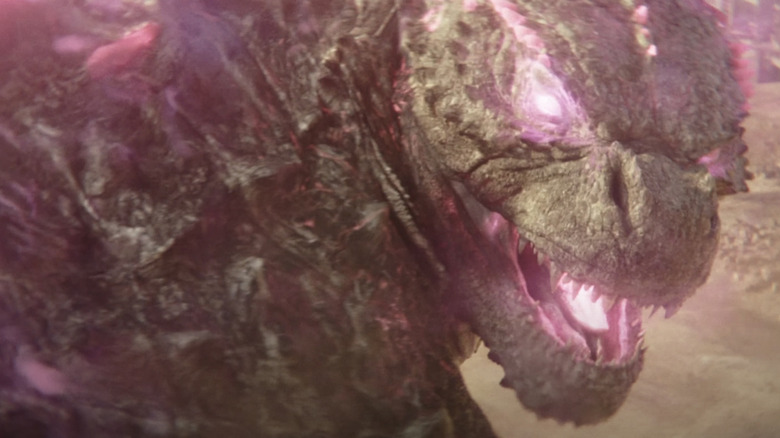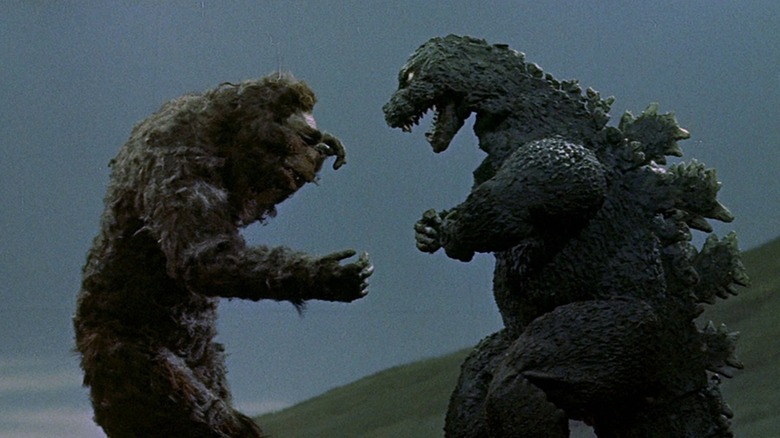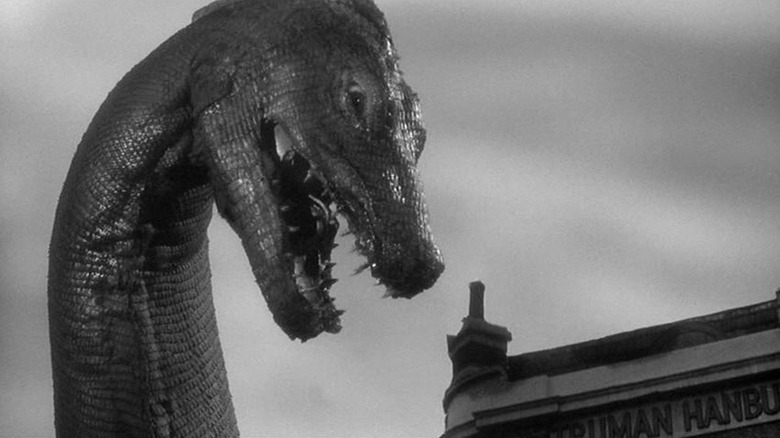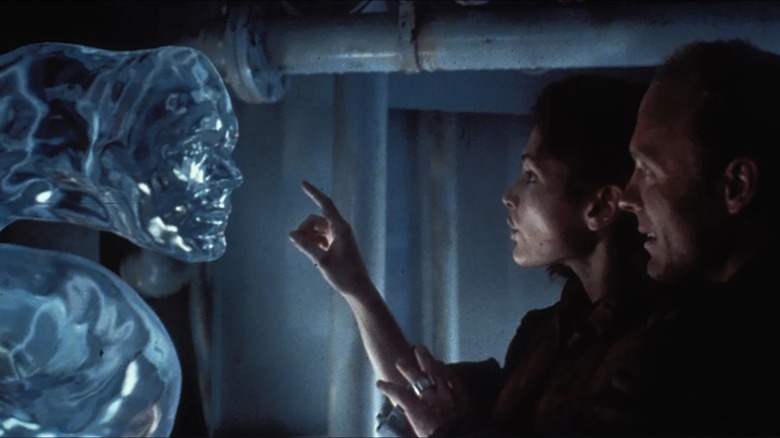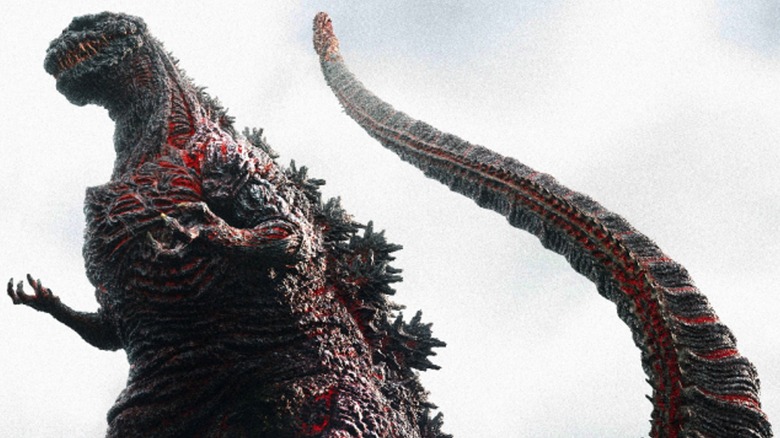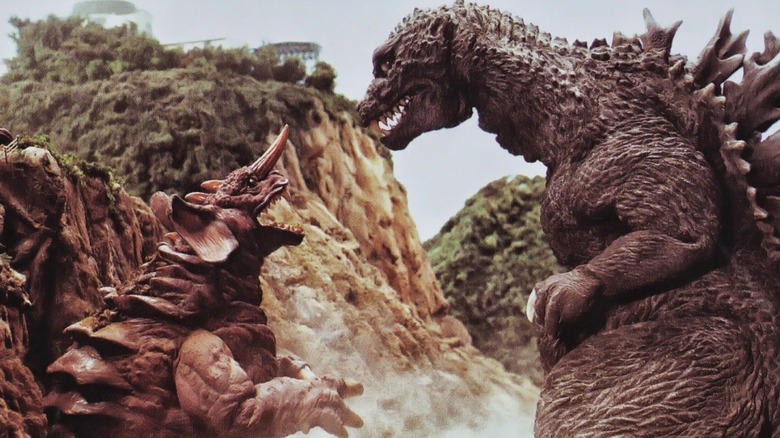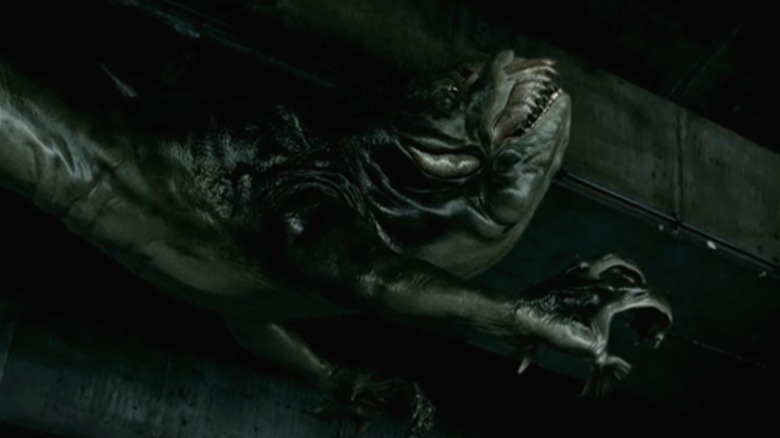If You Liked Godzilla X Kong, You Should Check Out These Monster Movies
Adam Wingard's "Godzilla x Kong: The New Empire" features an epic team-up between the legendary beasts, Godzilla and Kong, underlining the necessity to push aside a millennia-spanning feud to tackle an even greater threat. Firmly rooted in the perspective of the monsters, where most of the storytelling stems from nonverbal, evocative visuals (which are also cool as heck), "Godzilla x Kong" understands the appeal of the monster movie genre — it's pure spectacle that often tugs at the heartstrings. While it cannot get much simpler than that, the film does a commendable job of pitting two giants against a villain scorned, whose motivations culminate in destroying the world without a second thought about the cost of such an act.
The monster movie franchise is as gargantuan as the beasts that are featured in it, spanning back to 1933's "King Kong," which kickstarted a cultural phenomenon that still feels fresh and fun to this day. Although the vast number of MonsterVerse films are all worth checking out, we will be looking at all kinds of monsters for this list — after all, the term "kaiju" translates to "strange creature," referring to all creatures with a preternatural origin. While some fictional monsters are inherently malevolent or benevolent, others are neutral, even if their actions might seem antagonistic when measured against the yardstick of human perception.
Let's look at some monster movies that you might enjoy after watching "Godzilla x Kong: The New Empire," selected based on epic monster team-ups, mashups, or just the presence of a supernatural force too baffling for human comprehension.
King Kong vs. Godzilla (1962)
If you cannot get enough of Godzilla and Kong fighting each other, Ishirō Honda's "King Kong vs. Godzilla" is the perfect treat to cling on to that sentiment. Originally pitched as a story where Kong fights a Frankensteinian monster in San Francisco, the idea warped into the epic showdown between Kong and Godzilla after Toho took interest in the original script and made some changes. Here, the beasts are rubber-suit monsters who, at one point, get struck by lightning and indulge in far-fetched shenanigans. That's exactly why the film is so fun — there is no self-seriousness inherent in a tale where two beasts have a showdown.
There are some genuinely goofy moments here, both intended and unintended, elevating scenes such as when Kong is transported to Godzilla via balloons in hopes that the monsters will fight just because they are in each other's vicinity. Most of the film's outrageousness is deliberate, as Honda intended it as a satire of the Japanese television industry at the time, which often relied on exaggerated melodrama to snatch audience attention; every stunt was a means to garner ratings, no matter what the cost.
The Giant Behemoth (1959)
A kaiju movie that's a blast from start to finish despite its predictability, Eugène Lourié's "The Giant Behemoth" opens with a mystery. A fisherman is murdered on the beach, and his dying word is "behemoth" — an utterance made to feel more inexplicable after hordes of dead fish wound up on the shore shortly after. Moreover, the injuries on the deceased man look like radioactive burns, even though no radioactivity is detected on the beach, adding fuel to the theory that the monster in question is a mutated animal that has somehow been contaminated by nuclear testing. More murders occur, ramping up the suspense surrounding the perpetrator, who is also, by the way, invisible to radar.
Although "The Giant Behemoth" does not excel in originality, it does execute its central idea pretty well by crafting a murder mystery where the serial killer in question is a massive beast who just happens to emit radioactivity. The climax of the film, which involves an X-class submarine and attempts to shoot torpedoes at the monster, is pure entertainment. While it would be easy to dismiss the film in favor of better, more expertly-crafted ones, Lourié injects sincerity in the packaging of scientific investigations that the human leads take part in while unraveling the central mystery. For a monster movie about a marine animal that has undergone genetic mutation, "The Giant Behemoth" is surprisingly rooted in realism, and is refreshing to behold in spite of its myriad shortcomings.
The Abyss (1989)
Yes, this might be an uncharacteristic choice for a list that almost exclusively deals with giant monsters that terrorize urban spaces, but James Cameron's "The Abyss" is strangely entrancing for good reason. The severe struggles during its filming and production process warrant a dedicated discussion, given how the film's very existence feels mind-boggling and boundary-pushing, even by Cameron's incredibly high standards. In the film, a US submarine sinks under mysterious circumstances, and an underwater investigation is kickstarted which directly plunges us into a vivid, unfathomable territory that hides secrets not meant to be uncovered by the human race.
Although the underwater creatures in "The Abyss" — or monsters, depending on how you perceive them — are intriguing enough, the film ventures beyond the terrors of such an encounter, as it inverts moral scrutiny on humans and our penchant for mistreating one another. The results are undoubtedly ambitious both in tone and execution, where traditional heroes are questioned and profound, uncomfortable questions about existence are put forth in the most ingenious ways. Recently, "The Abyss" got a massive upgrade with its 4K remaster and theatrical re-release in theaters in December last year, retitled as "The Abyss: Special Edition," allowing us to appreciate the wonderful technical artistry that went into the making of this beautiful, bonkers experience.
Shin Godzilla (2016)
We are back in Godzilla territory with Hideaki Anno's toy-inspired "Shin Godzilla," Toho's third reboot of the franchise that is conceived as a metaphor for real-life environmental and man-made disasters that devastated Japan. The towering beast wreaks unimaginable havoc and reduces entire cities to debris with its radioactive presence, leaving politicians and scientists scrambling for solutions to contain the creature and leading to the creation of the hastily put together "Unidentified Creature Response Special Task Force." Although the socio-political overtones of the film are pretty serious and effective, Anno also leans into comedy when it is most required, bringing levity to an enjoyable concoction of themes that blend into something truly unforgettable.
More importantly, it is a Godzilla movie that feels eccentric in the most baffling ways, as most of its focus is on the interiors of corporate structures where human decisions to thwart the mammoth threat feel deliberately incompetent — a brand of satirical edge that only someone like Hideaki Anno could bring to life. The monster here is the catalyst for all kinds of hell that is unleashed in Tokyo but never the seminal focus, which is a perspective seldom employed in creature features — at least on a level that feels so uncompromising yet decidedly optimistic in the same breath.
Godzilla, Mothra And King Ghidorah: Giant Monsters All-Out Attack (2001)
Still considered one of the most compelling entries in the "Godzilla" franchise, "Godzilla, Mothra And King Ghidorah: Giant Monsters All-Out Attack," popularly dubbed "GMK," is pure kaiju excellence. Here, Godzilla is presumed dead, only to resurface with a rage that feels truly menacing, especially when it completely melts a US submarine with his flamethrower breath. There are no nuances to Godzilla here, and there is no need for them: Godzilla is a remorseless, rampaging monster set to destroy Tokyo, his legacy reaching mythical proportions when he rises from the grave and fights King Ghidorah and Mothra, who team up to prevent the newly-risen beast from trampling everything he sees.
What makes "GMK" stand out is its insistence on making Godzilla terrifying again, where his pupil-less visage strikes fear, and traditional antagonists like Ghidorah and Mothra are worth rooting for instead. This inversion feels like a breath of fresh air, despite several narrative choices that feel convoluted. Even baddies like Baragon get a chance to be one of the good guys this time, and the human protagonists are more than just rudimentary stand-ins to ground the experience. Although "GMK" pales in comparison to the original "Godzilla" (which excels in underlining the utterly strange bleakness of the situation), it is an enjoyable ride where beasts get to fight it out and the events end with a sliver of hope.
The Host (2006)
Bong Joon-ho's "The Host" tackles the concept of monsters quite literally, but constantly shifts the meaning of what constitutes said monstrosity and deepens the layers of the story by oscillating between the personal and the political. Part creature feature, part political satire, with a touch of black comedy and genuine emotional depth, "The Host" is an unconventional pick for a monster movie, but an essential experience that serves to broaden our horizons in terms of the genre. Of course, the focal point of a monster movie is a clash between titans or team-ups between beasts, but there is always scope for more, with much to glean when dealing with flawed characters who have to deal with a threat grander than the evils of everyday existence.
"The Host" looks at evil straight in the eye, right from its opening where an American mortician orders the dumping of formaldehyde into the Han River with brazen casual cruelty that is not remotely subtle. But that is the point, as the film wears its intentions on its sleeve — not merely alluding to grand metaphors or concepts, but directly engaging with them without compromise. It is an ambitious undertaking that works out in the end, weaving diverse tones seamlessly to illustrate monstrosities that are uglier than a ginormous, amphibious creature snaking its way around to kill and terrorize innocents.
